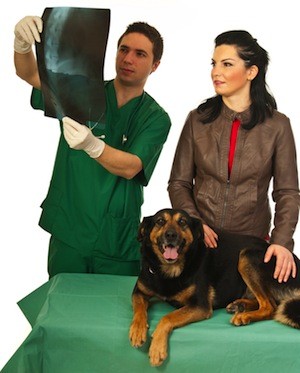
Alternative and complementary therapies have been used for thousands of years to remedy ailments and promote good health. Some popular therapies are even offered to animals. Because animals have similar spinal columns that can suffer misalignments over time, it might not surprise you to hear that animals can benefit from chiropractic care.
Many pet owners are seeking holistic therapies for their pets and, as a result, alternative veterinary medicine is experiencing new heights in popularity. [1] Chiropractic therapy is one such alternative approach sought by pet owners all over the world.
How is it Performed?
Adjustments performed on animals are similar to those performed on humans. Before performing a chiropractic adjustment, a physician will examine an animal's gait, posture, and vertebrae. Chiropractic adjustments are always done with care and the main focus is on being gentle and painless. Much like humans, chiropractic therapies for animals are designed to relieve pressure in the spine, among other areas, to realign the body and allow it to heal itself. Whether an animal is agile or frail, chiropractic care may help reduce discomfort and promote normal muscle and skeletal motion and function. This may help aging pets who suffer from soreness, degenerative diseases, and limited mobility.
Benefits of Chiropractic for Horses
Chiropractic has been a mainstay in the equine world, especially among racehorses. [2] The chiropractic techniques used focus on maximizing comfort while improving the overall function of the body. [3] [4] Animal chiropractic studies have shown that horses, many of whom suffer from back concerns due to a combination of incorrect riding methods and inexperienced riders, can greatly benefit from basic chiropractic techniques. [5]
Chiropractic manipulations have also shown a reduction in tension and over-extension in the backs of horses while improving symmetrical gate. [6] Unfortunately, there is a limited amount of research to date displaying the full range of benefits associated with chiropractic horse care. [7]
What Other Animals Can Benefit?
Animal chiropractic is not limited to horses; in fact, it has been shown to help exotic animals, like giraffes, zebras, and wild cats. It was even reported that a young giraffe at a Colorado zoo experienced improvement in neck tightness and sensitivity, muscle spasms, and increased range of motion following chiropractic care. [8]
A Final Thought
With the use of alternative veterinary medicine increasing in popularity, veterinarians are becoming more aware of the need for adopting some of these therapies. The ultimate goal of veterinarians when it comes to chiropractic therapy is to provide animals with a high level of immediate care. [9] There's little doubt that veterinary chiropractic is a fantastic adjunct to standard veterinary medicine.
References (9)
- Boldt E Jr. Use of complementary veterinary medicine in the geriatric horse. Vet Clin North Am Equine Pract. 2002 Dec;18(3):631-6, ix.
- Haussler KK. The role of manual therapies in equine pain management. Vet Clin North Am Equine Pract. 2010 Dec;26(3):579-601. doi: 10.1016/j.cveq.2010.07.006.
- Downing R. The role of physical medicine and rehabilitation for patients in palliative and hospice care. Vet Clin North Am Small Anim Pract. 2011 May;41(3):591-608. doi: 10.1016/ j.cvsm.2011.03.011. Epub 2011 Apr 13.
- Haussler KK. The role of manual therapies in equine pain management. Vet Clin North Am Equine Pract. 2010 Dec;26(3):579-601. doi: 10.1016/j.cveq.2010.07.006.
- Lesimple C, Fureix C, Menguy H, Hausberger M. Human direct actions may alter animal welfare, a study on horses (Equus caballus). PLoS One. 2010 Apr 28;5(4):e10257. doi: 10.1371/
- Gomez Alvarez CB, L'ami JJ, Moffat D, Back W, van Weeren PR. Effect of chiropractic manipulations on the kinematics of back and limbs in horses with clinically diagnosed back problems. Equine Vet J. 2008 Mar;40(2):153-9.
- Haussler KK. Back problems. Chiropractic evaluation and management. Vet Clin North Am Equine Pract. 1999 Apr;15(1):195-209.
- Dadone LI, Haussler KK, Brown G, Marsden M, Gaynor J, Johnston MS, Garelle D. Successful management of acute-onset torticollis in a giraffe (Giraffa camelopardalis reticulata). J Zoo Wildl
- Vockeroth WG. Veterinary homeopathy: an overview. Can Vet J. 1999 Aug;40(8):592-4.
†Results may vary. Information and statements made are for education purposes and are not intended to replace the advice of your doctor. If you have a severe medical condition or health concern, see your physician.







